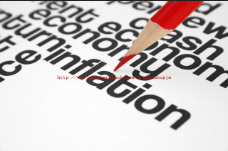Inflation is here: Bubbles and Wage Stagnation
Gold bounced a bit in price today while bitcoin roared to $7,753 before settling back at $7,325. Either way the dollar didn’t fair well versus the yellow metal and what some people believe is its cyber-doppleganger.
The Wall Street Journal posited the theory that gold’s price rose “on Doubts Over Tax Overhaul, Saudi Shake-up.” The financial paper of record came to the rationalization that if no tax package is passed, the economy won’t improve, the Fed won’t raise rates and that’s good for gold. Also, the Saudi palace intrigue and an attempted missile strike sparked some safehaven buying.
No analysts are using those theories to explain why bitcoin went up. It just goes up everyday.
Perhaps Bill Fleckenstein is onto something in today’s daily missive entitled “Trickle-down Inflation.” Fleckenstein’s catch-phrase is “"In a social democracy with a fiat currency, all roads lead to inflation." And while the government has created mountains of money, especially since the ‘08 crash, “inflationary forces haven't really trickled down aggressively to the masses, although they will at some point,” he writes.
As Murray Rothbard used to tell us in class, inflation benefits those who get the money first: government, friends of government, the wealthy. And thus, Fleckenstein points out, “the things that the high-end wants have gone up mightily, whether that's art, wine, real estate, or whatever sort of bauble might strike the fancy of someone with a lot of dough.”
There is no telling where new, cheap money will go, but some always seems to end up financing speculations. As Ludwig von Mises wrote,
The moderated interest rate is intended to stimulate production and not to cause a stock market boom. However, stock prices increase first of all. At the outset, commodity prices are not caught up in the boom. There are stock exchange booms and stock exchange profits. Yet, the “producer” is dissatisfied. He envies the “speculator” his “easy profit.” Those in power are not willing to accept this situation. They believe that production is being deprived of money which is flowing into the stock market. Besides, it is precisely in the stock market boom that the serious threat of a crisis lies hidden.
The government tells us every month there is no meat-and-potatoes price inflation. Fleckenstein tells us what the government won’t admit, “Unfortunately, both the PCE (the Fed's favorite tool) and the CPI have been concocted such that they will never show much inflation.”
While the government’s numbers don’t move, 56% of Americans have less than $1,000 saved. About a quarter of Americans have less than $100 socked away. Jack Holmes writes for Esquire,
It's a reminder that, while the larger economy has steadily recovered from the Great Recession, the gains have not yet surfaced at the local level. Another study reports that just 65 of the 3,069 counties in the U.S. have fully recovered from the near-collapse in 2008. But it also speaks to the enduring effect of decades of wage stagnation, when many Americans' pay has not kept up with inflation and they have been left further and further behind.
Isn’t wage stagnation really price inflation?
Mr. Fleckenstein believes inflation psychology is about to change. He doesn’t know when, or why, “it just feels like it will be something that we will see that will be totally understandable and yet very surprising.”
Maybe the inflation worm is already turning.






